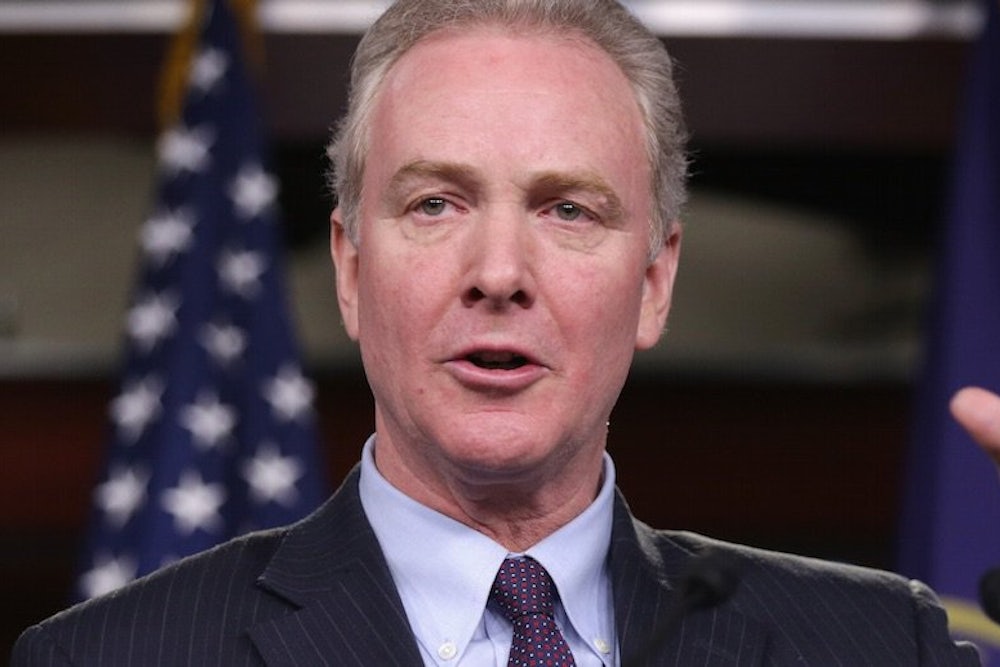For too long, it appeared that many Democrats were trying to fight economic inequality with policies like the minimum wage while ignoring the 800-pound gorilla, Wall Street. But Rep. Chris Van Hollen on Monday unveiled legislation to cut taxes for those earning less than $200,000, while partially paying for the proposal with a financial transaction tax (FTT), projected to raise $1.2 trillion over the next decade. With this proposal, Van Hollen is recognizing that without reducing financial speculation, it’s impossible to address inequality or to leave Wall Street’s risky practices in the past.
The small FTT in this bill—which also includes provisions to boost stagnant wages and close lucrative tax loopholes—wouldn't burden longer-term investors. The tax is applied to every transaction—the sale and purchase of a stock, bond, or other financial instrument—so as long as the investor holds the investment for a decent period of time, the tax is a tiny percentage of their overall portfolio and won’t drastically alter their trading behavior. It’s the high-frequency traders who have fought this tax tooth and nail, and who will gear up to fight it now, because if you trade multiple times a millisecond then your tax burden will be higher.
High-frequency trading creates systemic risk. Taxing it would reduce the incentive for the financial sector to chase new bubbles, driving out "noise traders" who make markets more volatile without improving capital intermediation (the purpose of the financial system). This is the argument of economists including John Maynard Keynes, Lawrence Summers, Victoria P. Summers, and Joseph Stiglitz: that reducing the “whirlpools of speculation” is one of the best method for risk reduction. We’ve seen the results of volatility among such traders in the flash crashes, where huge amounts of speculative trading can crash very, very quickly.
Given the recent experience of Dodd-Frank (not to mention the mounting attacks on it), and the failure of regulators in the lead-up to the crisis to accurately understand what was occurring and put the brakes on it, market-based approaches like a FTT are crucial to making sure Wall Street speculation doesn’t bring down the economy again. There’s also lots of evidence that all of this increased trading hasn’t actually made the financial sector more efficient, and that it has been a main driver of economic inequality. Because stock ownership is concentrated at the top (the bottom 90 percent own only 9 percent of stocks and mutual funds), the benefits of finance have accrued to the one percent. A 2011 study finds that “financialization accounts for more than half of the decline in labor’s share of income, 10 percent of the growth in officers’ share of compensation, and 15 percent of the growth in earnings dispersion between 1970 and 2008.” Thomas Philipon estimates that inefficiencies in the financial sector cost the U.S. economy $280 billion every year. Other studies support the conclusion that much of the sector subsists on rent-seeking.
Financial transaction taxes are nothing new. New York State, for example, had one in place from 1906 to 1981 (and one remains legally on the books, but it is refunded to the trader). Out of favor in the 1980’s and 1990s as Wall Street dominated the political and economic agenda, they have gained increasing interest among policymakers. And they’re not just on Occupy Wall Street’s agenda: Nobel laureates like Stiglitz and Larry Summers have called for modest transaction taxes to promote stability and raise revenue, and even the International Monetary Fund has cautiously supported a financial transaction tax. From 1914 to 1966, the United States levied a 0.02 percent tax on sales and transfers of stock. To this day, the SEC is funded by an incredibly small FTT. More recently, Senator Tom Harkin and Representative Peter DeFazio proposed the “Wall Street Trading and Speculators Tax Act,” which would assess a tax of 0.03 percent on trades of stocks, bonds, futures, options, swaps and credit-default swaps, and would generate $352 billion over 10 years. Europe is moving forward with their own FTT.
For the last two decades, taking on Wall Street hasn’t always been a focus for the Democrats. President Ronald Reagan initiated the rise of finance, but President Bill Clinton certainly helped with the passage of Gramm-Leach-Bliley Act, which dismantled key New Deal regulations (including large swaths of Glass-Steagall). The massive amounts of money finance sprinkled on both parties made them virtually immune to regulation. Finance, Insurance and Real Estate (FIRE) companies have dramatically increased their spending on lobbying in recent years, from $609,523,625 inflation-adjusted in the 2000 cycle to $996,406,725 in the 2012 cycle. Recently, IMF researchers linked lobbying to the rise of subprime mortgages and the opaque securitization schemes that left the financial crisis on a precipice.
As Nomi Prins has documented, financial power players have been deeply intertwined with the political process for a long time. However, finance’s political heft has never been greater, to the extent that a recent deregulation amendment was essentially written by financial industry lobbyists. In the wake of Dodd-Frank, bankers were granted 14 times more meetings with the Commodities Futures Trading Commission, the Treasury, and the Federal Reserve Board than pro-reform groups. Political scientist Christopher Wiko notes, “as the Democratic Party coalition began to include more professionals and managers, and as unions declined, the negative relationship between Democratic control of government and financialization weakened.” That is, many Democrats stopped worrying and learned to love the financial sector.
Van Hollen's proposal is an attempt to reverse this pattern. It’s well past time to get out of these whirlpools of speculation and onto stable, dry land.
